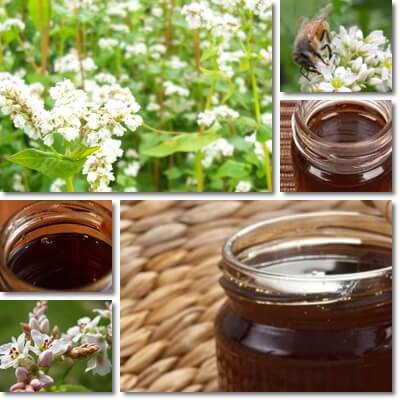Buckwheat is a variety of honey with a dark pigment and a taste to match its unusual color. The rich flavor profile and a strong taste intensity, along with its interesting pigment account for why it’s a preferred variety. Buckwheat honey is made from the nectar and, incidentally, the pollen of buckwheat flowers. It is known to hold benefits such as having a soothing effect on mucous membranes that provides relief for cold and flu symptoms such as a sore throat or pain due to irritation, antimicrobial properties that help with wound healing and improve recovery after respiratory infections as well as an impressive antioxidant action with anti-aging and protective benefits.
Raw, unheated buckwheat honey that has not been processed in any way, except maybe filtered to take out larger elements like propolis, beeswax, pollen or small chunks of honeycomb that upset the general texture of the honey, is the healthiest. Heating the honey, even only when we add it to hot tea or worse, cooking with it or heating it to change its more viscous consistency to a more fluid one can take away a lot, if not most of its properties, depending on how long the honey has been exposed to heat. And it takes very little heat to make it lose its beneficial effects. So if we want to enjoy all the benefits buckwheat honey has to offer, eating it raw, unprocessed, even unfiltered and avoiding heating it is the way to go.

Of course, like all honey varieties, buckwheat too can cause allergic reactions. You can have an allergy to buckwheat honey either because you are allergic to the pollen it contains, or because you are allergic to secretions produced by honeybees in order to make the honey. In the first case, pollen, which is added to honey accidentally when the honeybees collects nectar, can put the immune system into overdrive and make it overreact, hence the symptoms. At the same time, being allergic means you already have a somewhat overactive immune system, one that is more prone to react exaggeratedly to harmless elements.
In the second case, our body is more sensitive to special enzymes honeybees secrete to make the honey. These enzymes are crucial for the end result to be what it is and being allergic to anything honey bee-related generally means you are allergic to all honey varieties and honey products (honeycomb or sweets containing honey), not just buckwheat. If this is the case, you can’t eat honey at all or you risk setting off a severe allergic reaction and possibly anaphylaxis.
What does buckwheat honey look like? Buckwheat is a dark honey variety with a pigment ranging from a dark copper to a darker purple color. In sunlight, you can see the copper, brown-red reflexes of the honey, but otherwise it may appear almost black. Because not even monofloral honeys are made from one single nectar source and climate, weather conditions and other factors influence crop yield, the honey may contain varying amounts of other nectar sources (buckwheat remaining the principal one). This can engender slight differences in color and taste and, along with them, differences in the health effects of the honey. The lighter the honey, the less buckwheat nectar it has.
What does buckwheat honey taste like? This particular variety has a rich taste and a strong flavor. It has a medium-sweet, molasses taste with a malty, earthy, slightly spicy flavor. The taste is quite persistent and the flavors tend to linger in the mouth. It has quite a thick consistency and crystallizes slowly. Because of its stronger aroma, the honey is often used for cooking, but exposure to cooking heat can destroy most, if not all of its beneficial properties.

List of health effects
What are the health benefits of buckwheat honey? Here is a list of the most notable 6 properties and health benefits of buckwheat honey and what they mean for our health:
1) Natural antibacterial and anti-inflammatory action. Dark honeys like buckwheat generally have a high content of hydrogen peroxide, an antibacterial that occurs naturally in honey when glucose (a sugar) and glucose oxidase (an enzyme secreted by honey bees) interact. It is this antibacterial agent that is largely responsible for the antimicrobial and anti-inflammatory action of most honeys and effects such as faster wound healing, preventing acne breakouts or helping treat respiratory infections and their symptoms. The low moisture content, low pH (honey is acidic) and antimicrobial action of certain antioxidants also contribute to such effects.
What is interesting is that microbes have never exhibited resistance to the antimicrobial properties of honey, hence its efficiency in fighting off infection and antibiotic-resistant bacteria (Honey: its medicinal property and antibacterial activity). However, this doesn’t mean that honey can replace antibiotics because the latter are still life-saving medicines. It only means that in the right concentrations or preparations, honey can be made into an incredibly potent medicine, but research on the subject is still in its infancy.
2) Soothes sore throat and stomach discomfort. Buckwheat has a rather thick consistency and a low moisture content, characteristics which allow it to somewhat adhere to mucous membranes it comes into direct contact with, such as the throat and stomach lining. There, it forms a sort of protective coating that allow the mucous membranes to recover and heal, reducing sore throat discomfort, redness and irritation, but also stomach discomfort. Furthermore, its strong antibacterial action means that it also helps reduce bacteria numbers present in the throat, for example, which helps treat not only the symptom (the sore throat), but also the condition (the infection located in the throat).
3) Helps relieve cough. Buckwheat honey, with its dense texture and antibacterial agents, is a mild natural cough-suppressant that favors a faster recovery from infection. There are studies that show honey taken before bed can significantly suppresses the cough mechanism and allows for better rest, whilst reducing bacteria numbers, thus contributing to the treatment of upper respiratory tract infections in addition to calming cough and other symptoms.
4) Excellent antioxidant properties. Dark-colored honeys like forest honey (honeydew honeys) or buckwheat honey have been found to exert a stronger antioxidant action than lighter-colored honeys like acacia, for example. So a great deal of the pigment of buckwheat honey is given by strong antioxidants like polyphenols, particularly flavonoids, which protect cells from damage, disease and premature aging. Antioxidants also possess anti-mutagenic properties, meaning they prevent damage that can cause cells to mutate and potentially become cancerous by scavenging free radical molecules and preventing their harmful action.
5) Source of vitamins and minerals. Buckwheat honey contain small amounts of several important vitamins and minerals, notably vitamin C, potassium, magnesium, calcium and others, as well as other elements of nutritional value such as amino acids, ash, propolis or pollen. Although not nearly enough to meet our daily requirements, these nutrients are highly bioavailable and actively contribute to our good health.
6) Energizing effect. It goes without saying that the sugar content in buckwheat honey boosts our energy. After all, it’s sugar. But the honey also contains small amounts of vitamins, minerals and other nutrients, as well as different elements with antioxidant and other functions, all of which add to its nutritional value and contribute to its tonic, energizing effects. Moreover, the natural sugars in the honey are even good for the liver, contributing to its good functioning.
Recommendations
Including raw, unprocessed buckwheat honey into our diet helps make us healthier, but there are some aspects to consider, such as:
1) If you are allergic to buckwheat pollen, avoid the honey.
2) If you are allergic to honey bee enzymes, avoid honey and its byproducts.
3) Check the source of your honey to account for its quality.
4) Always go for local honey. Chances are, because it’s made closer, there’s no need for processing.
5) Look for certifications to make sure it’s organic, unprocessed or monofloral.
6) Purchase raw, unheated, unfiltered honey for the best benefits.
7) While it may give baked goods and other foods a rich flavor, try to use it as close as possible to its natural state.
8) Don’t look for bargains. Good honey, quality honey is not cheap.
Conclusion
Including raw buckwheat honey into our diet does not reverse bad health or undo years of bad eating or poor lifestyle choices. But it does work towards better health. And it does so gradually, by soothing our cough and sore throat, reducing the numbers of a certain bacterium that has caused our respiratory infection, soothing an irritated stomach or helping with skin sensitivity or acne breakouts. It is these little things that add up to more visible beneficial effects over time and eating some buckwheat honey is one of the ways we can work towards better health, provided we are not allergic to it.
